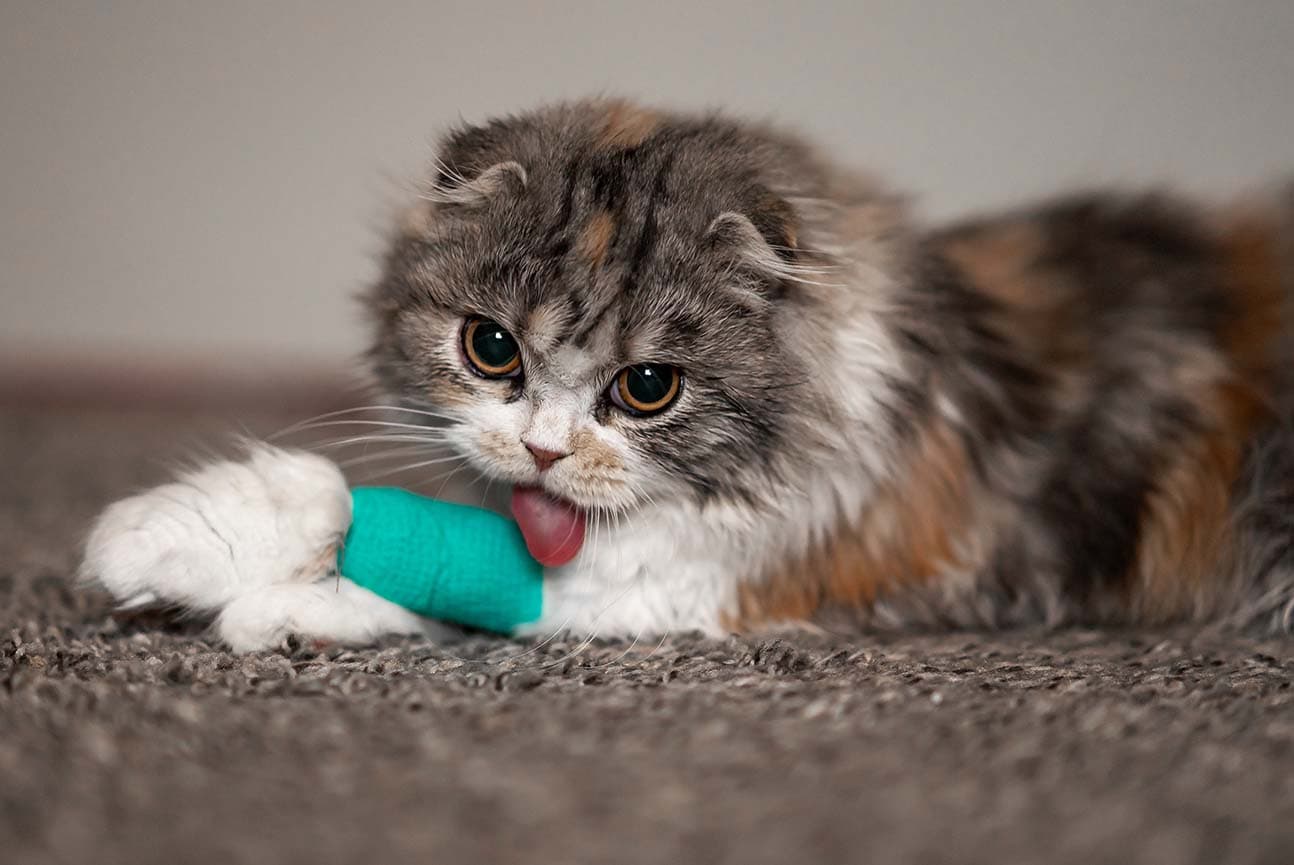Reviewed by Dr. Nicoletta Nica
Updated on 04/11/2025
Reading time 4 min.
Overview
Severity: Low
Life stage: All
Wounds in cats are common and range from minor scratches to serious injuries that need urgent veterinary care. They can result from play, fights, or contact with sharp objects, and while small grazes may be managed at home, deeper wounds, bites, and burns require professional treatment.
In Dubai, the warm climate and sandy environment increase the risk of infection and contamination, making careful cleaning especially important. Both indoor and outdoor cats face injury risks, so prompt assessment and veterinary attention are vital for proper healing. Quick action can make a big difference in recovery and overall well-being.
The most common causes of wounds in cats
Bite wounds
- Caused by bites from other cats, dogs or occasionally other animals
- Can appear as small puncture wounds or larger lacerations/tears
- Dog bite wounds often cause more internal damage than is immediately apparent
- Cat bite abscesses typically develop 2-3 days after the initial bite. They tend to begin as a painful swelling, but then rupture to release pus discharge
- In Dubai’s apartment living, bite wounds between cats sharing small spaces can be particularly common
Torn nails
- Often occur during active play or climbing
- Can result from overgrown nails catching on furniture or carpeting
- Sometimes caused by trimming nails too short
- Common in indoor cats who don’t naturally wear down their claws
Cuts, tears and grazes
- Lacerations result from contact with sharp objects such as glass, metal edges or broken tiles
- Grazes (abrasions) affect only the top skin layer and often occur from contact with rough surfaces
- Can also be caused by self-inflicted trauma from excessive scratching or grooming
Pressure wounds
- Develop from prolonged pressure on one area of skin
- Can occur when cats remain in one position for extended periods
- May result from incorrectly applied or too-tight bandages
- More common in elderly, overweight, or unwell cats
- Can be challenging to treat and slow to heal
When should I worry about my cat’s wound?
Seek immediate veterinary attention if your cat has:
- Penetrating wounds involving the chest or abdominal cavities
- Suspected snake bites (though rare in urban Dubai)
- Excessive bleeding or persistent bleeding that won’t stop within 10 minutes
- Deep wounds where bone is visible
- Eye injuries
- Signs of infection: swelling, discharge, bad odour, heat
- Burns from chemicals or heat sources
Contact your vet promptly for advice if your cat has minor cuts, animal bites, torn nails, or if you need guidance on wound care and preventing infection.
What to do if your cat has a wound
Serious wounds
- Keep your cat calm and still: stress and movement will worsen bleeding
- Apply firm pressure to heavily bleeding wounds, using a clean cloth
- For burns, rinse with cool (not ice-cold) water and remove any chemicals
- Transport to your nearest veterinary clinic immediately
- Be cautious: pain may cause normally gentle cats to bite or scratch
Other wounds (cuts, grazes, bite injuries)
- Apply gentle pressure with a clean cloth for up to 10 minutes if bleeding
- Clean the area with saline solution if possible: use 1 teaspoon salt in 500ml cooled, boiled water
- Remove any visible small foreign objects carefully
- Prevent licking, biting or scratching of the affected area
- Have the wound examined by a veterinarian to determine if further treatment is needed
Given Dubai’s dusty environment, thorough cleaning is particularly important to prevent sand and debris from causing infection.
Prevention of wounds in cats
Most wounds occur unexpectedly, but some prevention strategies include:
- Neutering male cats to reduce roaming behaviour and fighting
- Regular nail trimming to prevent overgrowth and snagging
- Securing balconies and windows in high-rise apartments
- Removing sharp objects and hazardous materials from your cat’s environment
- Using soft, appropriate bedding for elderly or unwell cats
- Avoid using homemade bandages
- Regularly reposition cats who are resting more than usual
- Keep your cat at a healthy weight and good body condition through proper diet and exercise
- Keep skin clean and dry, especially in Dubai’s humidity
Diagnosis of wounds in cats
Most traumatic wounds don’t require extensive diagnostic testing initially. However, your veterinarian may recommend additional tests for severe, infected, or slow-healing wounds:
- Wound swabs for bacterial culture and antibiotic sensitivity testing
- Skin biopsy if healing is abnormal
- Blood and urine tests to check overall health
- X-rays or advanced imaging if deeper tissues may be affected
Signs of infection
Watch for these concerning signs:
- Increasing swelling, redness or heat
- Discharge, particularly if smelly or discoloured
- Your cat is unwell or lethargic
Black or dead-looking skin around the wound is an emergency and needs immediate veterinary care.
How to treat wounds in cats at home
Always have wounds assessed by a veterinarian, particularly if the wound is large, deep, or shows signs of infection. For minor wounds, initial home care includes:
Keep wounds clean and dry
- Use a saline solution: 1 teaspoon salt in 500ml cooled, boiled water
- Clean gently 1-2 times daily for the first few days
- Pat dry thoroughly: humidity in Dubai makes this especially important
Prevent self-trauma
- Use protective collars (cone collars or inflatable)
- Consider medical pet shirts or baby grows for body wounds
- Apply bitter apple spray over bandages as a deterrent
- Restrict exercise until healing is complete
Support healing
- Apply veterinarian-recommended topical treatments such as medical-grade Manuka honey or antibacterial creams
- Monitor progress daily
What to expect with wound healing
Wound healing occurs in three phases:
- Inflammation and cleaning (first few days): Mild swelling as the body removes dead cells and debris
- Repair (5-14 days): New tissue grows to close gaps
- Maturation (weeks to months): Tissue strengthens and remodels
Most uncomplicated wounds heal within 5-14 days. Dubai’s climate may slightly extend healing times due to increased bacterial exposure and humidity.
Factors that can delay healing include underlying medical conditions, poor nutrition, certain medications, and environmental factors, such as excessive heat or contamination.
Vet treatment for wounds in cats
Treatment varies, depending on the wound’s cause, size, location and severity.
Mild wounds may require:
- Hair clipping around the affected area
- Thorough professional cleaning
- Removal of foreign material
- Nail trimming if damaged
- Appropriate bandaging
- Topical medications
- Antibiotics or pain relief where needed
Serious wounds may need:
- Emergency stabilisation
- Surgical repair with sutures (stitches) or staples
- Abscess drainage
- Removal of dead tissue
- Surgical drains, flaps or grafts
- Laser therapy
- Specialised treatments (such as antivenom for snake bites)
- Long-term bandage management
Are some cats more at risk of wounds?
All cats can sustain wounds, but certain factors increase risk:
- Young, active cats: More prone to cuts, grazes and tears from adventurous behaviour
- Outdoor or balcony-access: Higher risk of fights and environmental injuries
- Male, unneutered cats: More likely to fight and sustain bite wounds
- Elderly, overweight, or inactive cats: Greater risk of pressure wounds
- Multi-cat households: Increased potential for territorial disputes
Worried about a wound on your cat? Don’t wait. Book a checkup or emergency appointment today at Modern Vet Hospital in Dubai. Their experienced veterinary team provides expert wound assessment, treatment, and ongoing care to support proper healing and prevent complications. From managing minor cuts to providing advanced care for serious injuries, Modern Vet Hospital is your trusted veterinary clinic in Dubai for skilled and compassionate feline care.
Share this, choose your platform!
Reviewed by
Dr. Nicoletta Nica
DVM MRCVS
Dr. Nicoletta was born in Romania and studied veterinary medicine in Timisoara.After graduation Dr. Nicoletta remained in Timisoara, and worked for a small animal clinic.


